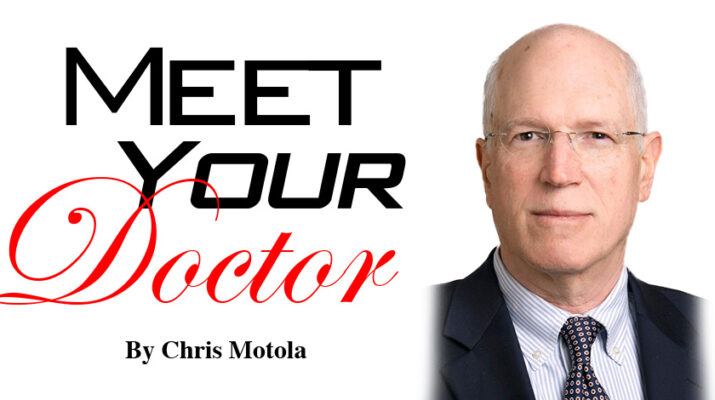Physician at DeGraff Medical Park’s ER, whose father was a rocket scientist, discusses changes in emergency medicine. “We’re never bored,” he says. “We never say no to anyone.”
By Christopher Motola
Q: How has emergency medicine changed and evolved since you started practicing?
A: For a long time it was the newest medical specialty. The emergency department was the emergency room and it was staffed by young doctors-in-training. It’s so much better today. I’m glad to have been a part of the improvement. The enthusiasm was there initially, but now there’s background and training. Kaleida’s a teach system, so I’m very happy to participate in the training of young doctors who are learning it as a specialty.
Q: How did you first come to the Buffalo area?
A: My father was a rocket scientist, so we went wherever his work took us. We came to Buffalo when I was in grade school when he went to work for Bell Aero Systems. It’s been home since then. I love it here.
Q: What are some of the main qualities to modern emergency medicine? Do you function as a kind of urgent primary care? How broad is your scope on an individual level?
A: I could talk for hours about this. Clearly our current situation has put enormous pressure on emergency medicine because we’re fortunate enough to have the safeguards to be able to deal with COVID patients while protecting ourselves. That has been very, very challenging for primary care, so we’re glad to take up that demand. But the emergency department is a lot of different things. It’s a system in Western New York with specializing in pediatrics, trauma, stroke and cardiovascular. But, there are also a lot of emergency rooms that are not as specialized. That department I’m in is a general emergency room. We used to be a small hospital. DeGraff isn’t a hospital anymore, but we’re closely affiliated with Millard Fillmore Suburban Hospital, so we have the necessary backup and disposition to get patients admitted. But as you were asking, emergency providers do need to be jacks of all trades. That’s a defining characteristic. We can’t select our patients — they select us. So we have to be comfortable with not having a lot of control. We have to initially stabilize anything that comes our way. While we refer patients to other specialties, we’re comfortable with seeing just about anything.
Q: How do you work in a specialized field with minimal control?
A: I think psychologically, some practices are able to exert a lot of control. A patient can call with a problem and they can say “that’s not something I can deal with.” But we don’t have that kind of control. We design our environment to optimize our ability to be able to deal with a lot of different things. And it really is a team effort. The nurses in our emergency department have a lot of experience. Staff who have been there have been there long enough to be very skilled. But we can’t control the volume and we can’t control what they have. Nowadays I’m only training young doctors specializing in emergency medicine, but over the years I’ve trained doctors from other specialties who rotated through the emergency room. It became very clear that personality is very important. Some people were just not comfortably able to deal with that lack of control, and were probably better off somewhere you don’t have to improvise.
Q: On the other hand, is the chaos a feature for the right kind of person? Maybe someone who enjoys novelty?
A: It is interesting. We’re never bored. There’s a bit of a—it’s not really a paradox—but in almost every field there’s a practitioner who has narrowed their focus to a very small area. And we know that person knows more than we do about that aspect of medicine. But we’re there 24/7. We never say no to anyone. I’m really proud of that at this stage of my career. I have an idealistic side, and I’m proud that whether the patient is a paragon of society or someone the ambulance found laying on the ground and we’ll do our best to treat them equally, because they may even have the same problem.
Q: You may not even know who they are.
A: Exactly. We do see patients on their worst days of their lives. Some of those patients may be dirty or unkempt because of their situation. We’re human, but we try not to judge.
Q: With how politicized COVID-19 has become, especially with stories about overburdened ICUs, what impact has it had on emergency departments?
A: It’s a very unfortunate situation of medical science being overwhelmed by political beliefs. Doctors and nurses are applied scientists, so there was no issue in our group with everyone getting vaccinated. Masks are good. We can’t distance ourselves from our patients. We take barrier precautions. We have an obligation to make our environment as safe as possible. This isn’t my area of expertise, but I’ve been a motivated observer, but I think social media has played a big role in helping crackpots reach a large audience.
Q: What kind of legacy do you want to leave for your students. What do you want them to remember when they’re your age?
A: I’m very grateful and humbled to have been part of a training program that has elevated the quality of care over Western New York. This training program began just about 30 years ago. All over the associated emergency departments, they’re staffed by physicians who were trained in this program. Everyone’s care has benefited. That’s a lasting impact.
Lifelines
Name: Martin Barron, MD
Position: Physician at DeGraff Medical Park’s Emergency Department
Hometown: Buffalo
Education: Jacobs School of Medicine and Biomedical Sciences
Affiliations: DeGraff Medical Park, Kaleida Health
Organizations: None currently
Family: Wife, three kids
Hobbies: Sailing, performing in his rock band

